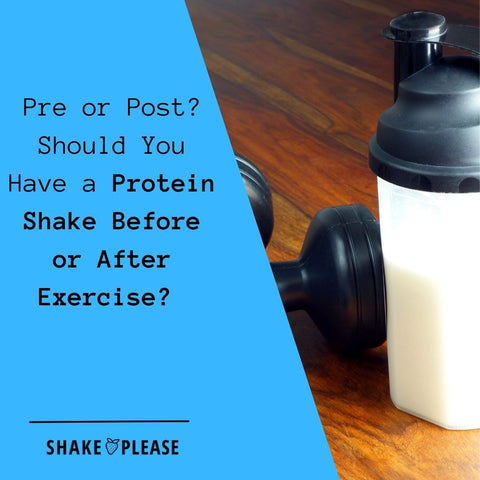Optimizing Your Nutritional Strategy

Discover the ideal timing for your protein shake before or after your workout to maximize those gains.
When it comes to building muscle, protein plays a crucial role. Not only is it essential for repairing and rebuilding muscle fibers after a workout, but it also provides the necessary amino acids for muscle growth.
Protein is the building block of muscles, and without an adequate intake, your efforts in the gym may go to waste.
Whether you choose to consume protein before or after your workout, ensuring that you're getting enough protein is key to maximizing your muscle gain.
Protein Shake Before Workout: Pros and Cons
Consuming a protein shake before your workout has its advantages. One of the main benefits is that it provides your muscles with a readily available source of amino acids during your workout.
This can help prevent muscle breakdown and promote muscle protein synthesis. Additionally, having a protein shake before exercising can provide a boost of energy, helping you perform at your best and push harder during your workout.
However, some individuals may experience digestive discomfort or feel too full if they consume a protein shake immediately before exercising. It's important to listen to your body and adjust your timing accordingly.
On the flip side, consuming a protein shake before your workout may not be ideal for everyone. If you have a sensitive stomach or find that having food or liquid before exercising makes you feel sluggish, you may prefer to have your protein shake after your workout.
It's all about finding what works best for your body and your specific fitness goals.
Protein Shake After Workout: Pros and Cons
Having a protein shake after your workout is a popular choice among fitness enthusiasts. One of the main advantages is that it provides your muscles with the necessary nutrients to kickstart the recovery process.
During a workout, your muscles undergo stress and damage, and consuming protein immediately afterward can help repair and rebuild them more efficiently. Additionally, a post-workout protein shake can help replenish glycogen stores and promote muscle growth. Studies have shown that consuming protein after exercise can enhance muscle protein synthesis and improve muscle recovery.
However, timing is crucial when it comes to post-workout protein consumption. It's recommended to have your protein shake within 30 minutes to an hour after your workout for optimal results. Waiting too long may delay the muscle recovery process and hinder your progress.
Additionally, some individuals may find it challenging to consume a protein shake immediately after exercising due to logistical reasons or personal preferences. In such cases, it's important to have a plan in place to ensure you're still getting the necessary protein intake within the post-workout window.
Timing Your Protein Intake for Maximum Muscle Gain
To maximize your muscle gain, it's important to consider the timing of your protein intake. While the overall daily protein intake is crucial, dividing it strategically throughout the day can have additional benefits.
Research suggests that consuming protein evenly throughout the day, with a focus on having an adequate amount around your workout, can optimize muscle protein synthesis and promote muscle growth.
For those who prefer to have their protein shake before their workout, having it approximately 1-2 hours before exercising can be beneficial. This allows enough time for digestion and absorption, ensuring that the amino acids are available when your muscles need them the most.
On the other hand, if you choose to have your protein shake after your workout, aim to consume it within the post-workout window of 30 minutes to an hour to take advantage of the heightened muscle protein synthesis and recovery process.
Factors to Consider When Deciding Between Pre and Post-Workout Protein Shake
When deciding between having a protein shake before or after your workout, there are several factors to consider.
Firstly, personal preference and tolerance play a significant role. Some individuals may find it more comfortable to have a protein shake before their workout, while others may prefer to have it afterward. It's essential to listen to your body and experiment to find what works best for you.
Secondly, the duration and intensity of your workout can influence your protein timing strategy. If you're engaging in a long and intense training session, having a protein shake before and after your workout may be beneficial to support muscle recovery and prevent muscle breakdown. On the other hand, for shorter and less intense workouts, having a protein shake after your workout may be sufficient.
Lastly, your overall daily protein intake should be taken into account. While the timing of your protein intake around your workout is important, it should be viewed as part of your overall protein distribution throughout the day. Aim to consume an adequate amount of protein at each meal and snack to support muscle growth and recovery.
Alternatives to Protein Shakes for Pre and Post-Workout Nutrition
While protein shakes are a convenient and popular choice for pre and post-workout nutrition, they are not the only option. Whole food sources can also provide the necessary protein and other nutrients to support your fitness goals.
Some alternatives to protein shakes for pre-workout nutrition include Greek yogurt, cottage cheese, or a balanced meal containing lean protein, carbohydrates, and healthy fats.
For post-workout nutrition, you can opt for whole foods such as chicken breast, fish, eggs, or quinoa, which provide a complete amino acid profile. These whole food options can be combined with carbohydrates to replenish glycogen stores and promote muscle recovery.
Best Practices for Incorporating Protein Shakes into Your Workout Routine
If you choose to incorporate protein shakes into your workout routine, there are a few best practices to keep in mind.
Firstly, choose a high-quality protein powder that suits your dietary preferences and goals. Whey protein is a popular choice due to its rapid digestion and absorption, but there are also plant-based options available for those following a vegan or vegetarian diet.
Secondly, pay attention to the ingredients and nutritional profile of the protein powder you choose. Avoid products with excessive added sugars or artificial additives. Look for a protein powder that provides an adequate amount of protein per serving and complements your overall macronutrient needs.
Lastly, consider the timing and frequency of your protein shake consumption. If you're having a protein shake before your workout, aim to have it 1-2 hours before exercising. If you choose to have it after your workout, try to consume it within the recommended post-workout window of 30 minutes to an hour.
REVOLUTIONIZING NUTRITION: BRACE YOURSELF FOR THE ULTIMATE PROTEIN SHAKE EXPERIENCE!
The Science Behind Protein Digestion and Absorption
To understand the optimal timing for protein intake, it's important to dive into the science of protein digestion and absorption. When you consume protein, it undergoes a series of processes in your body to be broken down into amino acids.
These amino acids are then absorbed into your bloodstream and transported to your muscles, where they are used for various functions, including muscle repair and growth.
The time it takes for protein to be digested and absorbed varies depending on the source of protein and other factors such as the presence of other nutrients in your stomach. Generally, whey protein, which is commonly found in protein shakes, is rapidly digested and absorbed, making it an excellent choice for pre and post-workout nutrition.
Casein protein, on the other hand, is slower to digest and is often used as a bedtime protein source to provide a steady release of amino acids throughout the night.
Common Myths About Protein Timing and Muscle Gain
There are several myths and misconceptions surrounding protein timing and muscle gain. One common myth is that you need to consume protein immediately after your workout to maximize muscle growth.
While timing is important, research suggests that the overall daily protein intake and distribution are more crucial factors. As long as you're meeting your daily protein needs, the timing of your protein intake around your workout can be flexible.
Another myth is that consuming too much protein can lead to increased muscle growth. While protein is essential for muscle growth, exceeding your protein needs won't necessarily result in more significant gains.
The body can only absorb and utilize a certain amount of protein at a time, and any excess is excreted.
3 PROTEIN SHAKES A DAY FOR MAXIMUM RESULTS
Conclusion: Finding the Right Protein Timing Strategy for Your Fitness Goals
In conclusion, the timing of your protein intake plays a role in optimizing muscle gain, but it's not the sole determining factor.
Whether you choose to have a protein shake before or after your workout, what matters most is meeting your overall daily protein needs and distributing it strategically throughout the day. Personal preference, tolerance, and the duration and intensity of your workouts should also be taken into account.
Experiment with different timing strategies and listen to your body to find what works best for you.
Remember that protein shakes are just one option for pre and post-workout nutrition, and whole food sources can also provide the necessary nutrients for muscle growth and recovery.
Ultimately, finding the right protein timing strategy aligned with your fitness goals will help you maximize your muscle gain and overall performance.





